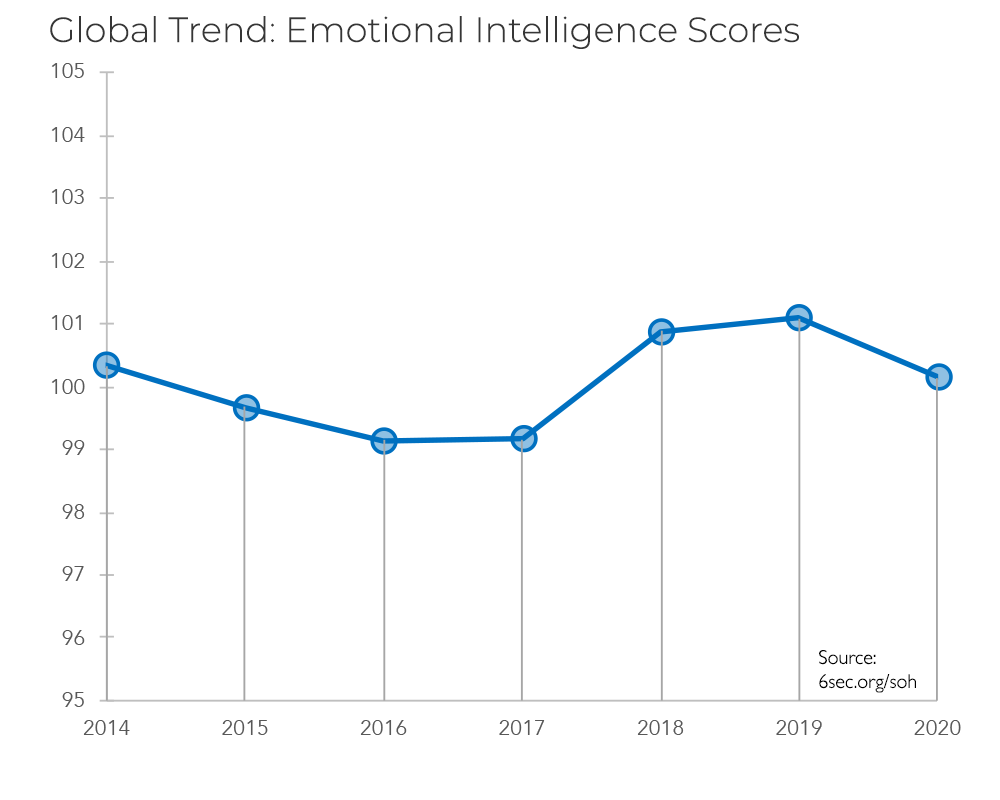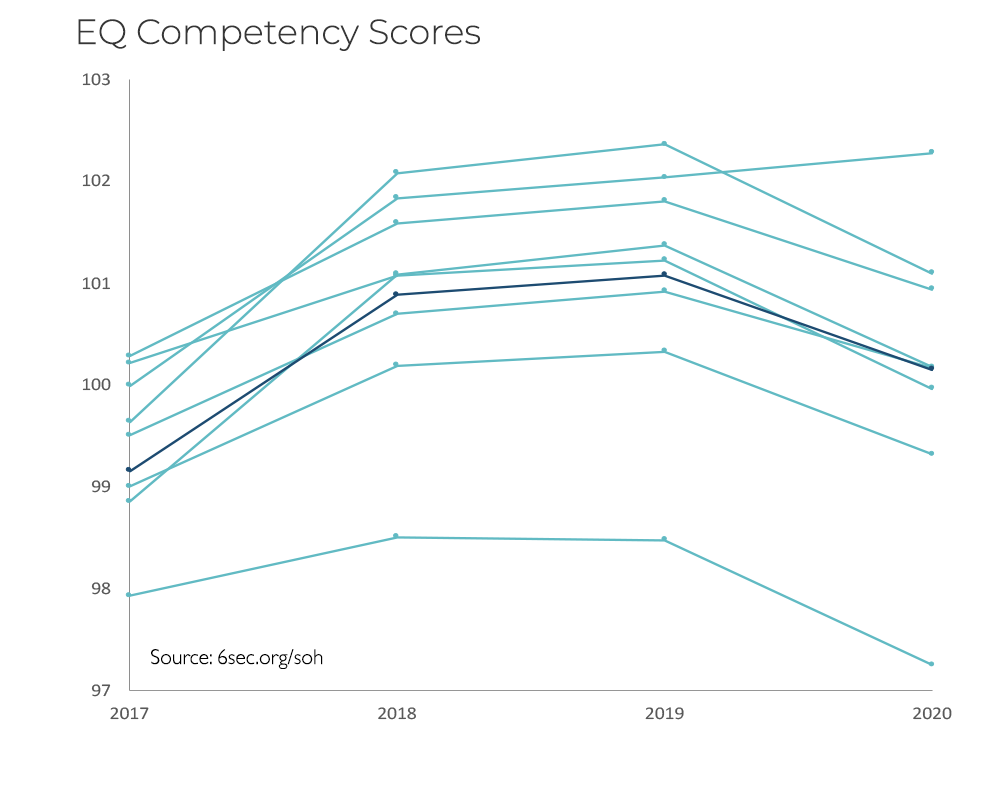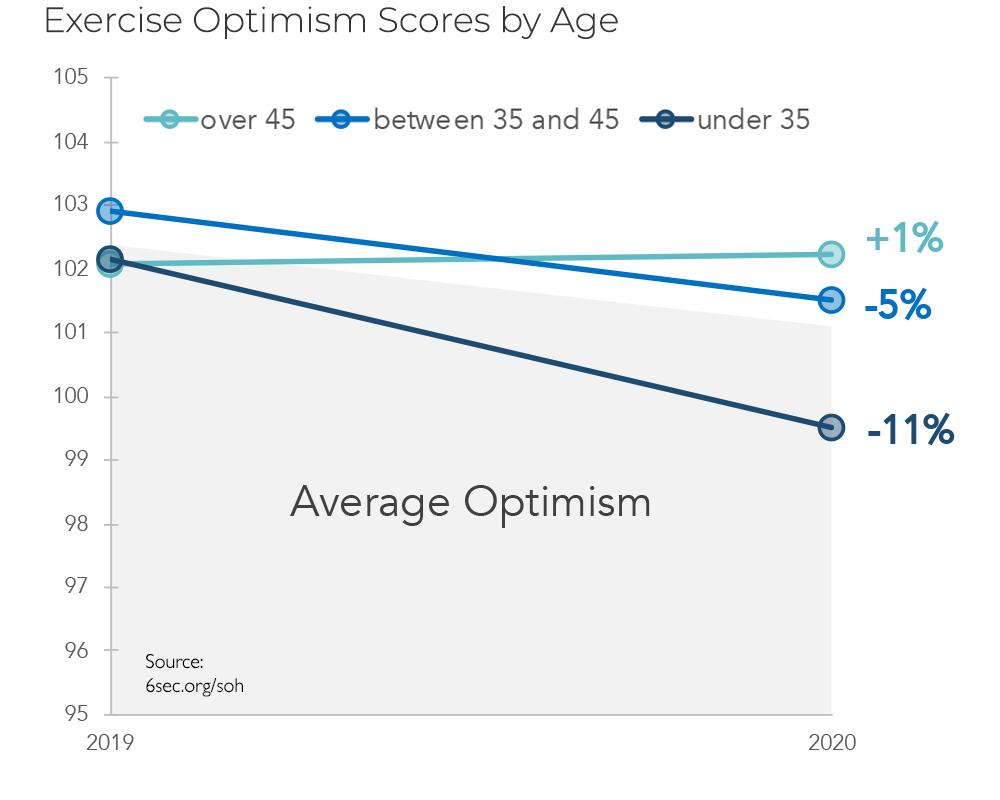How Did the Pandemic
Impact People’s
Emotional Intelligence?
Key insights from the world’s largest emotional intelligence study on optimism, risk and more during COVID-19
How did the COVID-19 pandemic impact people’s emotional intelligence? This graph tells a clear story – global emotional intelligence trends looked good from 2017 to 2019… and then 2020 happened:

Emotional intelligence (EQ) declined (almost) across the board. In a year dominated by stress, loneliness and fear, this doesn’t exactly come as a surprise. But a closer look at the data reveals some fascinating nuances for how the pandemic impacted specific age groups and demographics – and why it’s absolutely essential that we reinvest in some of the emotional intelligence skills that we’ve collectively lost this past year.
Pandemic Pummels Optimism: Did You Feel Burnt Out in 2020?
The emotional intelligence skill that saw the biggest decrease in 2020? Exercise Optimism, which is defined as the ability to see options. It went down 5%. And, as we reported about the future of work, related skills like collaboration, imagination, and risk taking all saw declines of more than 10% globally (2021 State of the Heart study).
Looking at the neurobiology, this decline makes sense. When we feel stress, we are biologically programmed to be less creative, less compassionate, less visionary. The body literally shuts down these systems as it narrows its focus, conserves energy, and focuses on nothing but the threat at hand.
There are, however, two big problems with this trend:
The first is that our stress response system evolved to deal with tangible, temporary threats – like a tiger stalking you in the jungle – not long-term existential threats. When we experience high stress for weeks or months at a time, it leads to exhaustion and burnout – and that’s exactly what has been happening.
The second problem is that optimism is really important. It’s strongly correlated with important outcomes like making good decisions, having quality relationships, working effectively and maintaining mental and physical wellbeing. In fact, people with high optimism are 8x as likely to score high in these outcomes. What is arguably the most important emotional intelligence skill went down the most in 2020. Interestingly, though, it didn’t go down equally for everyone.
Optimism Losses Hit Younger People the Hardest
One interesting caveat: when it came to optimism, the pandemic hit younger people much harder than older age groups:
As you can see, people over 45 experienced a slight increase. Note that this is from a huge, global, randomized sample (more about the research). Why would the pandemic have impacted younger people’s optimism more intensely than older people’s?
Joshua Freedman, one of the researchers who leads the study, hypothesized that it may be due to adults’ higher levels of structural stability: While the work setting changed, work continued. While family responsibilities changed, parents still took care of kids. Older adults have more of these “anchors,” while younger people had their lives more thoroughly upended and experienced more chaos. Further research would help us better understand how different age-groups experienced the pandemic, which could assist people in building back better.
There is, however, one emotional intelligence skill that increased in 2020, across age groups. What is it?
A Single Outlier: What Emotional Intelligence Skill Became Indispensable?
On this graph, which line is moving in the opposite direction of the others in 2020?

Only 1 of the 8 core emotional intelligence skills measured in this study increased in 2020: Apply Consequential Thinking, which is the ability to evaluate the costs and benefits of choices. We all got plenty of practice strengthening those muscles this year:
Is it safe to go to the grocery store? To see my friends and family? To celebrate Christmas together? To eat at a restaurant?
Like never before, the pandemic conditioned us to make these calculations – to weigh the pros and cons of things we used to take for granted. If we used this competency well, hopefully it helped to keep us and our loved ones safe. It has also recalibrated our entire disposition in a way that presents long-term risks: A heightened sense of caution is valuable in a crisis, yet over time it will limit innovation & creativity. This competency pushes us away from risks and toward safety — which often means retreating. That’s understandable under high stress. Playing it safe has its advantages in a pandemic, but also definitely comes at a cost.
And as many countries enter a new phase of the pandemic, it’s time to intentionally choose a new attitude of hope and optimism. “We have to readjust to being open to possibilities and the unknown, as opposed to just playing it safe all the time,” Freedman says. “While millions of people are still suffering, and dozens of countries are facing vaccine shortages, we might have an end in sight. While we have difficult work to do to care for people and heal, perhaps now we can begin to dream again of a better future.”
And considering the massive problems we face globally, it’s not just dreaming for the fun of it. It’s dreaming to come up with a new normal that significantly moves the needle in a better direction.
A New Normal: How to exercise optimism for a better future
When the term “new normal” surfaced in 2020, it had a decidedly negative connotation: Things aren’t going back to how they were. Get used to it. Accept it. Masks are in. Crowds are out. Et cetera, et cetera. “New normal” meant we have less options, just on a more permanent basis.
But now, as much of the world reawakens, “new normal” can take on a much more positive tone. A pause like this – as painful as it’s been – is a once-in-a-lifetime opportunity. To change habits. To make intentional choices about how we want to live. To dream up new ways to collaborate – to see new options instead of cruising on autopilot. We may never have a blank slate again quite like 2021.
How will you use optimism to make the most of this time of transition?
There’s no shortage of issues on which to focus our attention: climate change, racial injustice, economic inequality. They are all unique, yet interconnected. The strongest link between them? They won’t change if we just go back to what we were doing – the same ways of thinking, acting and feeling that have failed to address these issues for so long. They will continue to worsen, unless we act. That’s where optimism, imagination, and collaboration come in. Those muscles atrophied as we narrowed our focus on one particular crisis in 2020, but now, they are more important than ever.
The Six Seconds Model of Emotional Intelligence is a 3-step process – a simple and powerful framework for making better decisions. Ask yourself these questions to tap into your optimism and bigger purpose:
What am I feeling?
What options do I have?
What do I truly want?
You may also like…
- Pursue Noble Goals in the Six Seconds Model of EQ - July 29, 2023
- Increase Empathy in the Six Seconds Model of EQ - July 26, 2023
- Exercise Optimism - July 24, 2023



Great article, i love it.
This is such a great article. I used it in a recent presentation centered on EI. I had a question come up and thought I’d pose it here. When we were seeing increases in EI up until 2017, what was leading to that increase in EI?
Well done with this article! I enjoyed the way you presented it and the way you made it interesting. Please make more posts like this I will continue to support you